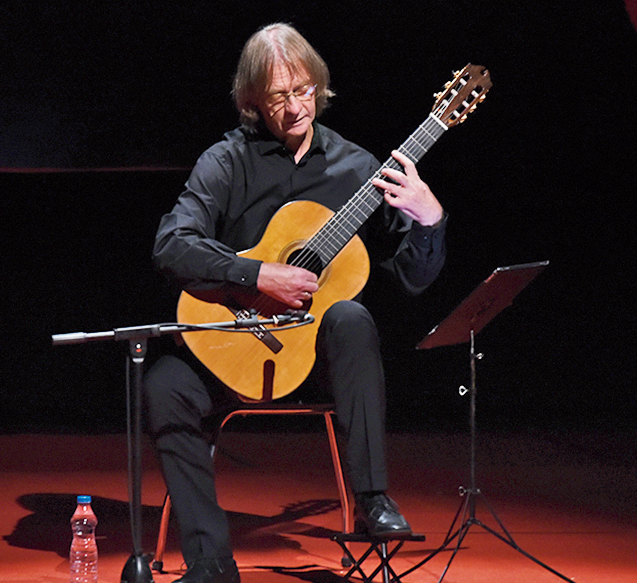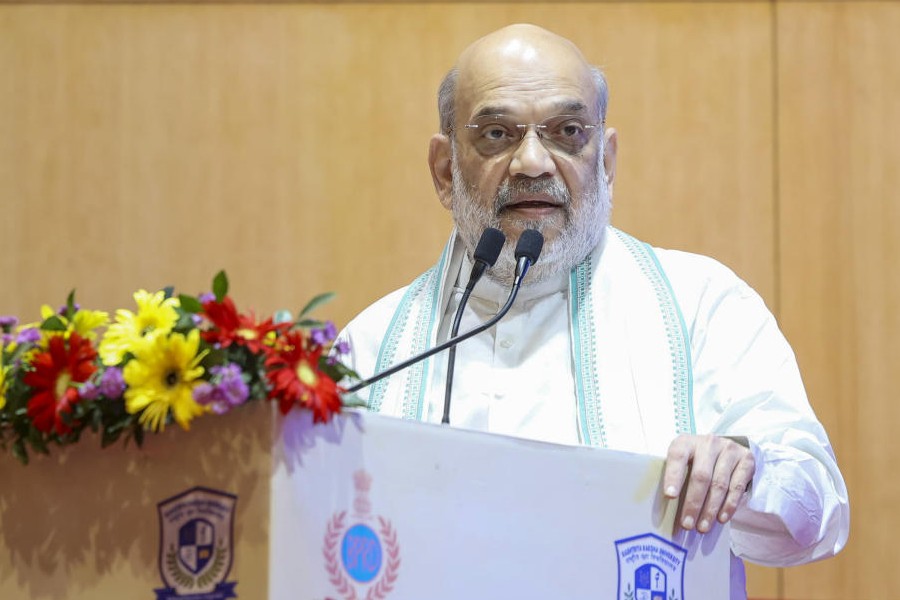When it comes to hosting bona fide international superstars in music, Calcutta often gets the short end of the stick, with sponsors and organizers — and, perhaps, even performers themselves — preferring to go to Bangalore, Delhi or Mumbai. This is particularly true in the case of musicians who have enjoyed global commercial success alongside critical acclaim, which is why it was a rare privilege to have had an instrumentalist of the stature of David Russell play to a Calcutta audience as part of the 10th Calcutta International Classical Guitar Festival. Russell is a musical superachiever — among many other milestones in his long career playing Matthias Dammann guitars, he has been named a Fellow of the Royal Academy of Music in London in 1997, declared an honorary member of the Spanish Amigos de la Guitarra in 2009 and, while at it, also bagged a Grammy award as best classical instrumental soloist in 2005 for his CD, Aire Latino. It is not difficult to see why the Satyajit Ray Auditorium at the ICCR was packed with classical guitar fans last month. They turned out in large numbers, prepared to be enthralled by the maestro.
Witnessing Russell live is a lesson in why his performances are so engaging beyond his extraordinary virtuosity. He was an affable host, explaining the programme notes in his characteristic modest manner, putting his audience at ease as though they were about to spend a relaxed evening with an old friend. He started with a well-curated set of pieces by the Paraguayan virtuoso classical guitarist-composer, Agustín Barrios, deftly interspersing the religious tones of El ultimo tremolo with the pining undercurrents of the barcarolle, Julia Florida, and the Danza Paraguaya No. 1, putting to rest any doubts about the guitar being able to stand its ground in a piano-driven world. This was followed by the Introduction and Polonaise for guitar by the largely-forgotten French composer, Napoleon Coste, who did the heavy lifting of keeping interest in the guitar alive between the 1830s till the close of the 19th century, which is generally regarded as a time of neglect for the instrument.
A highlight of the evening was Russell’s performance of two of J.S. Bach’s chorale preludes, which are imbued with religious meaning and, naturally, have a singer or a choir as a usual practice. The first was the Wachet auf, ruft uns die Stimme, BWV 645 (“Awaken, there is a voice calling us”) — with its beautiful melody, it is arguably one of the most famous pieces of Advent music — followed by the famous chorale movement, Jesus bleibet meine Freude (“Jesus, joy of man’s desiring”) from Cantata BWV 147. Russell’s flawless technique and complete command over complex passagework were evident. As he moved on to Enrique Granados’s Dance No. 5 and Isaac Albéniz’s Granada and Asturias — both composers’ works were essential to the rise of Spanish musical nationalism in the late 19th century — his agile fingers glided nimbly over the frets, sans any kind of visible effort or scraping.
A delightful change of tone followed with a selection of traditional Celtic music. These included a medley of Irish and Scottish jigs and a beautiful, slow piece by Peter Maxwell Davies called Farewell to Stromness. Russell’s lyrical phrasing brought out the work’s stunning simplicity, which makes it a modern classic given that its creator was known for his difficult, tonally-advanced compositions.
In a fitting fashion, Russell ended with Barrios, including two folkloric waltzes — the lesser known Vals de Primavera (or the springtime waltz) and the more famous Vals en Sol. Particularly captivating, though, were his performances of two heartland-Paraguayan pieces. The first was Caazapa, modelled on Central and South American folk songs, embodying Barrios’s tribute to the people and the music of his homeland. The piece de resistance, however, was Un sueño en la floresta (“A dream in the forest”) . It is perhaps one of the most complex tremolo compositions ever conceived for the classical guitar, with its mounting romantic melody hiding the daunting technical work it involves. Playing Barrios is a formidable task; Russell did it masterfully. Few could do it better than him.











